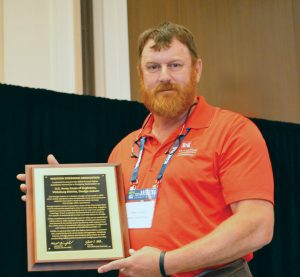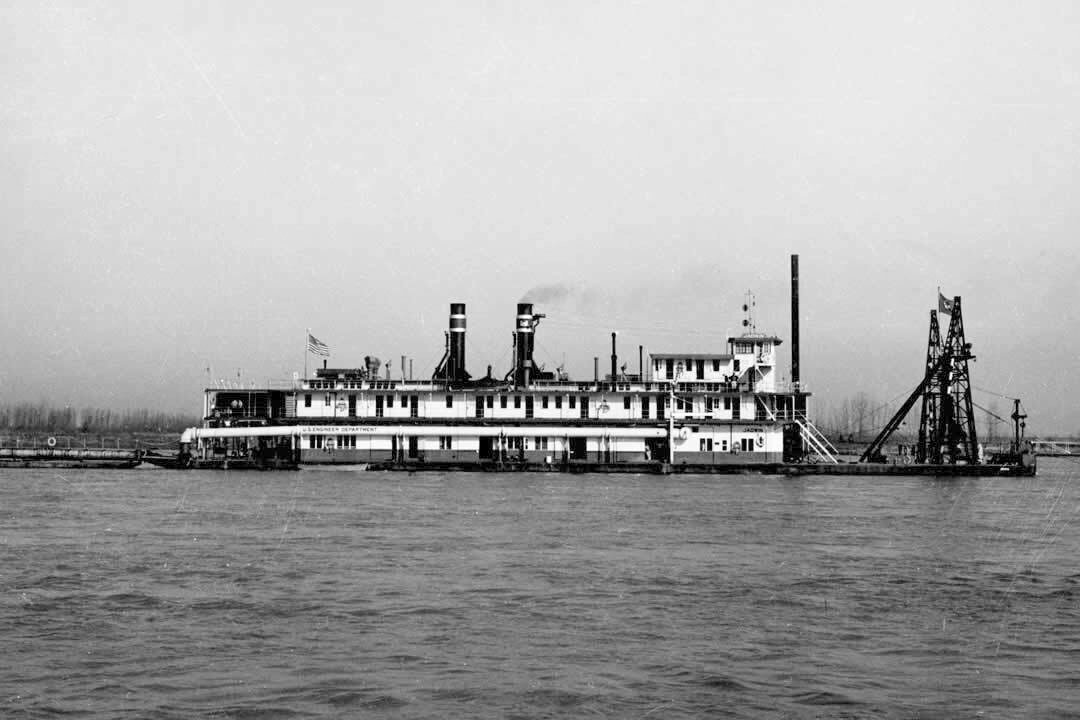The Corps of Engineers Dredge Jadwin, its crew and its owners—the Vicksburg Engineer District—has been awarded the 2024 Western Dredging Association (WEDA) Annual Safety Excellence Award for a “dredging stakeholder.” The dredge’s master, Capt. Charles F. Ashley Jr., accepted the award on behalf of the Vicksburg District and crew at the WEDA Dredging Summit and Expo in Tampa, Fla., in June.
The Jadwin received the award because of the outstanding safety record the crew has maintained, with no reportable accidents or injuries for two years.
The Jadwin is a dustpan dredge that has been maintaining the Mississippi River and tributaries since 1933, running 24 hours a day during the dredging season. Through the years, the Dredge Jadwin has been upgraded as necessary to keep it safely operational.
Under Capt. Ashley’s leadership, the dredge maintains an established safety culture, including daily toolbox meetings, continuous teamwork and personal ownership of the work and safety standards by every member of the 52-person crew. Ashley receives support from the entire Corps chain of command, allowing operation in alignment with standards of Corps Safety Manuals CE-SOHMS and 385-1-1.

Capt. Charles F. Ashley Jr. holds the plaque honoring the safety record of the Dredge Jadwin at the WEDA Summit and Expo in Tampa in June. (Photo by Judith Powers)
Capt. Ashley has been assigned to the Jadwin for 30 years, working his way up to master in November 2017. His pride in the Jadwin and its crew is obvious as he described the work routine, six hours on and six hours off, with meals available from the four cooks aboard the dredge.
Capt. Ashley works a 10-day-on, five-day-off schedule, with Jason E. Turner, assistant master of the Dredge Jadwin, taking over in his absence.
“One of us is on the dredge at all times,” Ashley said.
Each two-week tour on the dredge includes two 40-hour work weeks before changing over. Crew members can volunteer for overtime in times of emergency, such as the low river crisis several years ago, or when the crew was depleted during the COVID-19 pandemic.
The dredge is charged with clearing river crossings in the deep draft channel south of Baton Rouge, La., and the shallow draft channel north of Baton Rouge. Winches and anchors pull the dustpan into shoals, and the dredge pumps sand into the current. Water jets liquify the bottom material for the pumps, which push it through a discharge pipe aft of the vessel. Each crew member stays busy in what is often hazardous working conditions because of currents, passing traffic and the presence of buried pipelines and other hazards.
“My biggest feat was holding a crew together during COVID,” Capt. Ashley said. “We didn’t miss a day. There was no scenario for that. To lose 10 or 15 members of a crew was difficult, and we had no guidelines for dealing with it.”
He established a procedure where everyone was tested for the virus before getting on the boat. If someone tested positive after they were on the boat, he called the river ambulance to remove that person. Then he disinfected that person’s quarters for 24 hours before using it again.
“There were monitoring stations all over the boat,” Ashley said. “The office people were working remotely, but we had a job to do [so] we had to make it work safely for the crew. The river keeps flowing. The river keeps things going.”
Ashley mentioned collaboration with industry during the 2023 low water season as another key to the Jadwin’s success. During low water operations, a contact pilot from the towboat industry was placed on each Corps dredge in order to manage passing traffic and allow the dredges to work uninterrupted. That partnership is ongoing.
Capt. Ashley’s interest in the Dredge Jadwin and its history led to him reading the biography of Major General Edgar Jadwin, who was chief of engineers from 1926 to 1929, and who sponsored the plan for the Mississippi River flood control program that Congress adopted in 1928. The Dredge Jadwin was named after him two years after his death in 1931.
The Safety Award plaque describes the hazards the crew overcame to maintain its accident-free record, and concluded with, “WEDA, in partnership with the Safety Commission, presents this award to the U.S. Army Corps of Engineers, Vicksburg District, Dredge Jadwin and congratulates them on their outstanding safety performance and dredging partnership.”
The plaque hangs in the front dining hall on the Dredge Jadwin.




